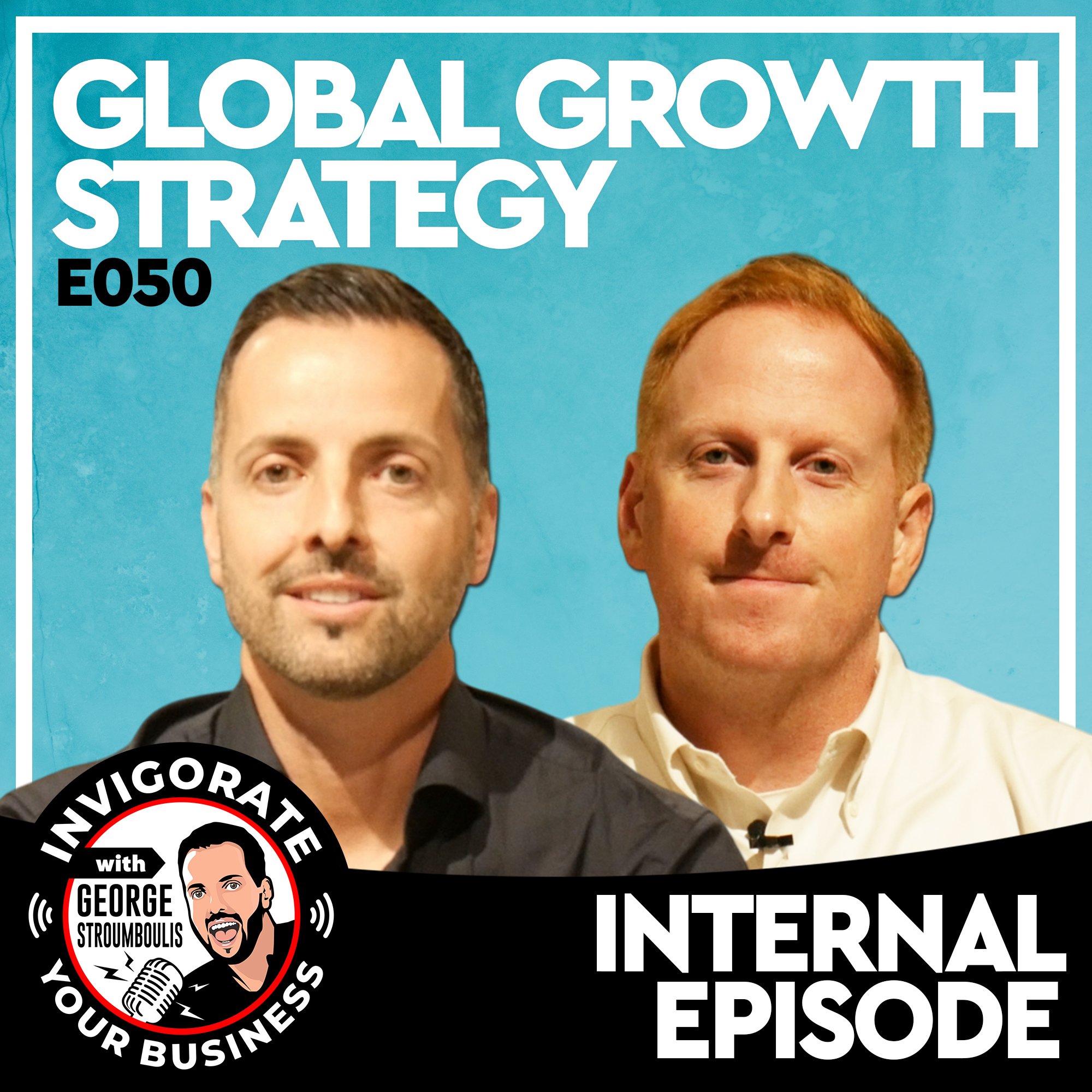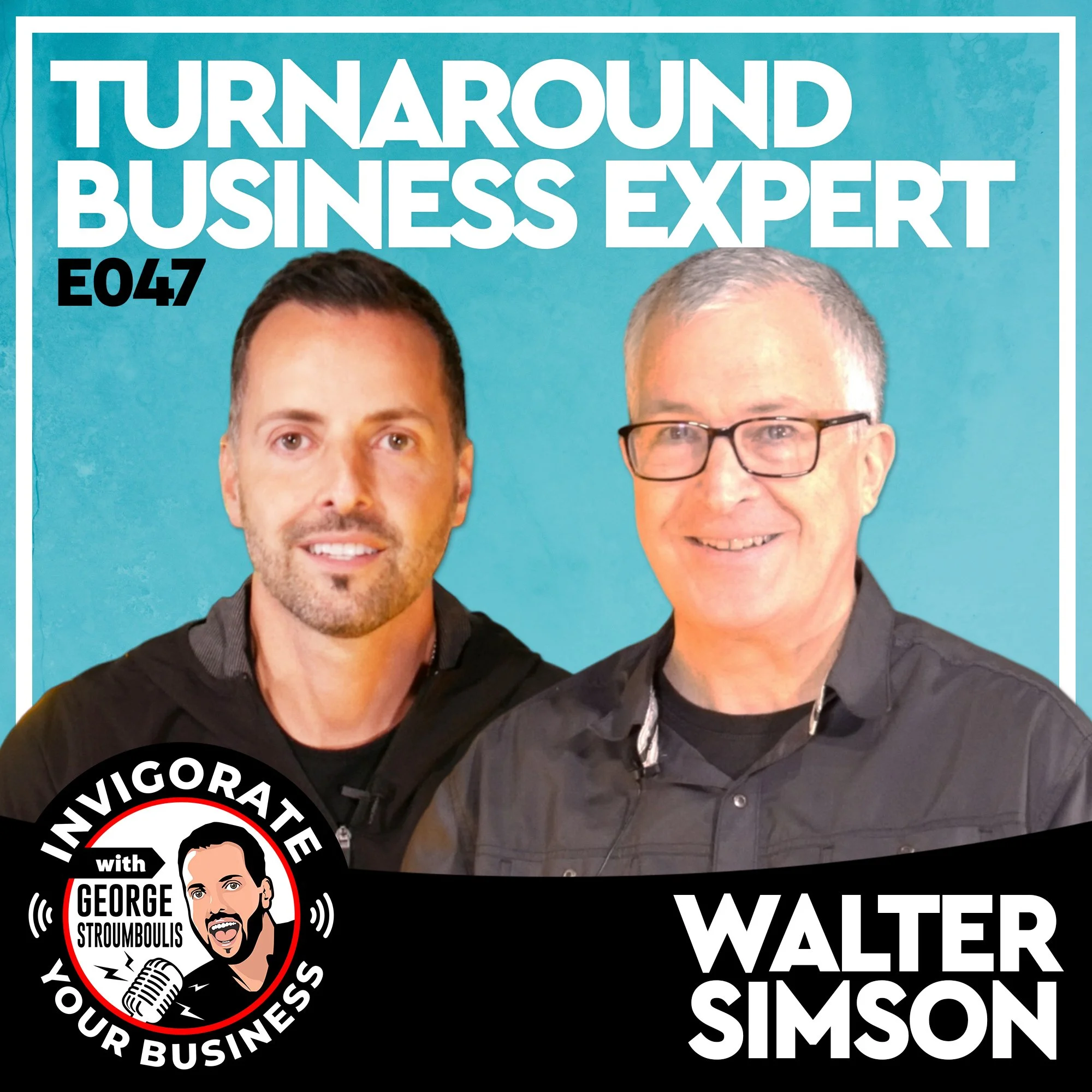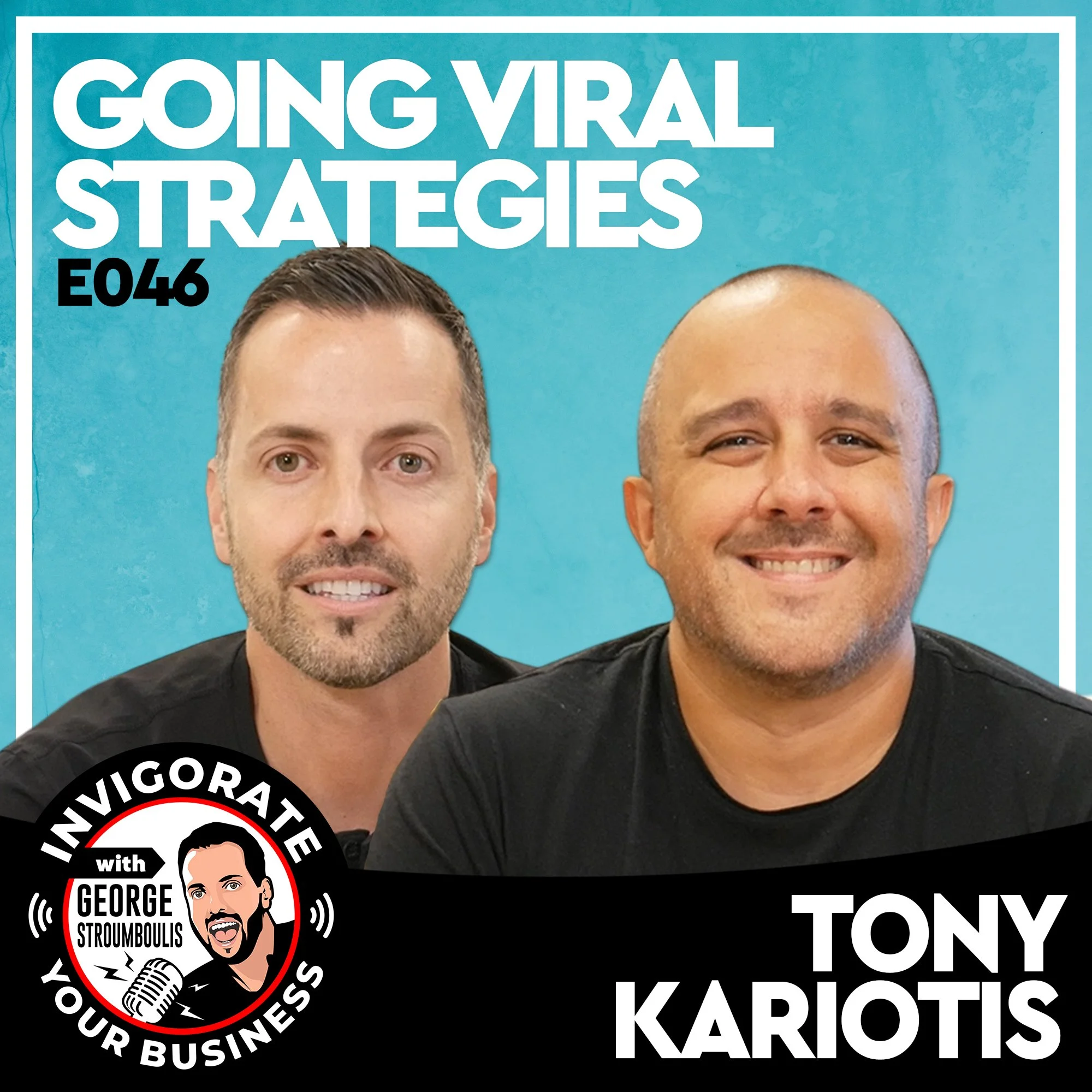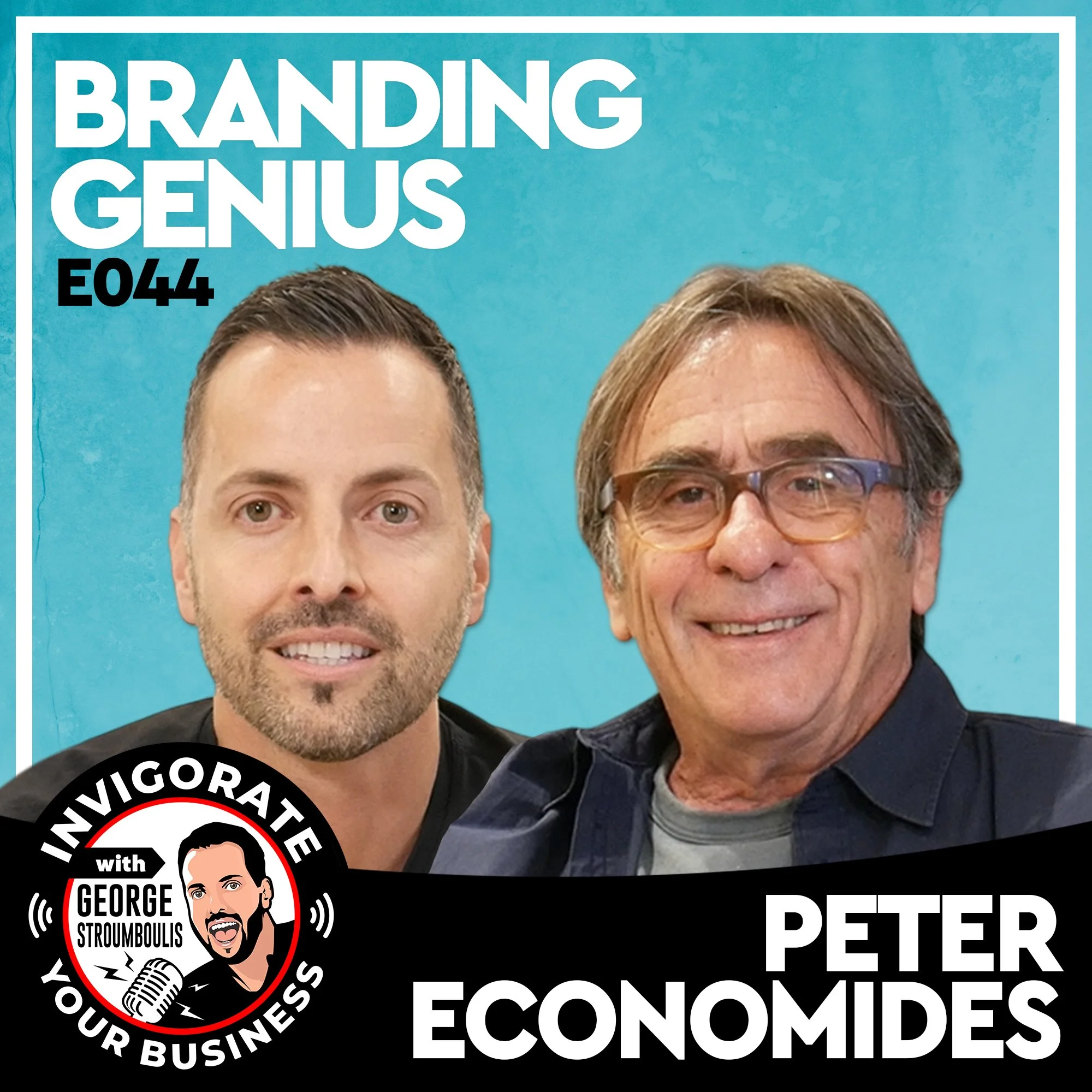BOOTSTRAP FINANCING - INTERNAL EPISODE | E013 PODCAST
LISTEN TO THIS EPISODE ON ALL STREAMING SERVICES
INTERNAL EPISODE FROM BARCELONA, SPAIN
George Stroumboulis sits down for an internal episode in Barcelona, Spain with Chris Hartswick to talk about their business on the topic of financing, investment and how they got started with Ideoli.
George Stroumboulis and Chris Hartswick, Co-Founders of Ideoli Group, sit down in Barcelona, Spain to talk about all things money, funding, investments, credit building and financing as it relates to their business from startup through to explosive growth. Giving advice on how to build your business credit rating when starting with nothing and what steps to take to build up your financial reputation and stability through financial institutions and client partnerships. The boys also talk about their business trip in Spain and their attempt to watch a FC Barcelona soccer match, their visit to the Integrated System Europe show and the various installation sites throughout the city with their lighting products are installed in.
WEBSITE: https://www.ideoli.com
“When needing financial support for your startup, always make sure to build your business credit reputation by taking on lines of credits and repay them quickly.”
MEDIA RELATED TO THE EPISODE
George Stroumboulis sits down with Chris Hartswick in Barcelona, Spain at the Hotel Arts Barcelona on the Invigorate Your Business Podcast to talk about all things financing.
George Stroumboulis sits down with Chris Hartswick in Barcelona, Spain - overlooking the beachfront at the Hotel Arts Barcelona on the Invigorate Your Business Podcast.
Chris Hartswick in Barcelona, Spain at the Hotel Arts Barcelona.
George Stroumboulis in Barcelona, Spain at the Hotel Arts Barcelona.
ABOUT THE “INVIGORATE YOUR BUSINESS” PODCAST
The Invigorate Your Business with George Stroumboulis podcast features casual conversations and personal interviews with business leaders in their respective fields of expertise. Crossing several industry types and personal backgrounds, George sits down with inspiring people to discuss their business, how they got into that business, their path to the top of their game and the trials and tribulations experienced along the way. We want you to get inspired, motivated, and then apply any advice to your personal and professional lives. If there is at least one piece of advice that resonates with you after listening, then this podcast is a success. New episodes weekly. Stream our show on Spotify, YouTube, Apple, Amazon and all other platforms.
ABOUT GEORGE STROUMBOULIS
George Stroumboulis is an entrepreneur to the core, having launched several ventures across multiple industries and international markets. He has held senior-level positions at progressive companies and government institutions, both domestically and internationally, building an extensive portfolio of business know-how over the years and driving profit-generating results. George’s ability to drive real change has landed him in several media outlets, including the front page of the Wall Street Journal. George was born in Toronto, Canada to his Greek immigrant parents. Family first. Flying over 300,000 miles a year around the world puts into perspective how important family is to George’s mental and emotional development. With all this travel to global destinations, the longest he stays even in the most far-out destination is 3 days or less - a personal rule he lives by to make sure he is present and involved in family life with his wife and three daughters. To read about George’s global travels, stay connected with his blog section.
STAY CONNECTED WITH GEORGE STROUMBOULIS
STREAM & LISTEN TO THE PODCAST:
SPOTIFY: https://open.spotify.com/show/1rW2CmxQoiJNEPOZupJlvd
YOUTUBE: https://www.youtube.com/user/Stroumboulis
APPLE iTUNES: https://podcasts.apple.com/us/podcast/invigorate-your-business-with-george-stroumboulis/id1607693240
AMAZON MUSIC: https://music.amazon.com/podcasts/8fc03929-71b3-483a-a64e-153e30b3d462/invigorate-your-business-with-george-stroumboulis
iHEARTRADIO: https://www.iheart.com/podcast/269-invigorate-your-business-w-92187370/
STROUMBOULIS SITE: https://www.stroumboulis.com/podcast
PODCAST SITE: http://www.invigorateyourbusiness.com
OTHER SERVICES: GOOGLE, PANDORA, OVERCAST, CASTRO, CASTBOX, PODFRIEND, PLAYER.FM, PODCASTADDICT, PODCHASER, PODCASTINDEX and RSS FEED.
FOLLOW GEORGE STROUMBOULIS:
INSTAGRAM: https://www.instagram.com/georgestroumboulis/
YOUTUBE: https://www.youtube.com/user/Stroumboulis
LINKEDIN: https://www.linkedin.com/in/Stroumboulis/
TWITTER: https://twitter.com/Stroumboulis
FACEBOOK: https://www.facebook.com/georgestroumboulis
TIKTOK: https://www.tiktok.com/@georgestroumboulis
CONTACT GEORGE DIRECTLY: https://www.stroumboulis.com/connect
FULL SHOW TRANSCRIPT
George Stroumboulis: Put on our jerseys. Went downtown, found a bar. Watched the last 10 minutes of the game.
Chris Hartswick: Watched the game. Had some drinks with some locals.
George Stroumboulis: Started a fight because we were angry and they all went home.
Chris Hartswick: It was good. I mean, it was fun. Obviously, it wasn't as good as going to the game.
George Stroumboulis: Hey guys, welcome to Invigorate your business with George Stroumboulis. We are in Barcelona, Spain. Such a cool city. Hence the jersey over here. We got a funny story about us going to or attempting to go to an FC Barcelona game. We're here, we're doing business. This is an internal episode. I have Chris Hartswick here, who's my business partner. And we're talking about just our experiences and going over everything. And specifically, about financing for a startup company and then taking it from startup to growth and what we've done to position ourselves to be in a good place financially, to support our growth. Working with our partners, working with our vendors. Really exciting. We talk about a bunch of other stuff. We visited a trade show, a European trade show called ISE, which is the Integrated Systems Europe Show. Basically, it is a show for all this cool technology when it comes to controls, controlling your home, lighting, audio, visual. We're working with a really big company based out of the UK to do facade lighting back home and just really, really strong partner, great products. So, we spent a lot of time with them. Visited a bunch of job sites that we're working on and actually some new client meetings. So, really fun discussion. Good stuff packed in. So stay tuned. Make sure please, you subscribe to all the channels on YouTube, on Spotify and Apple, wherever you listen. Please comment if you'd like to hear more stuff, things that resonate with you and just share when you can.
My name is George Stroumboulis and I'm extremely passionate about traveling the world, meeting new people and learning about new businesses. Join me as I sit down with other entrepreneurs to learn about their journeys. This episode of Invigorate Your business starts now. So we're in Barcelona, Spain.
Chris Hartswick: Yes, we are. We've been traveling.
George Stroumboulis: You been here before?
Chris Hartswick: No. Layovers in the airport.
George Stroumboulis: Yeah?
Chris Hartswick: Yeah.
George Stroumboulis: Counts? Doesn't count?
Chris Hartswick: No, it doesn't count.
George Stroumboulis: Right. Like, if that counted, yeah, I don't think so. If you haven't been in the town. So we got here last night. And today we're here, it's early in the morning. We got a lot of meetings, actually. Right. We're going to go to two job sites that have our product installed. We're going to go to a massive trade show. And we'll talk about that for a bit. And we're meeting a huge partner that's helping us do these projects. So, again when we go to new cities, what do we like to do?
Chris Hartswick: Really, just get out in the city. Experience it, walk around, meet people. Try to enjoy it to a certain extent. Whatever we can do.
George Stroumboulis: So, I got to share the story from last night.
Chris Hartswick: Let's do it.
George Stroumboulis: Okay. So I'm wearing a Barcelona hat and when we book trips, they're aggressively quick.
Chris Hartswick: Yeah.
George Stroumboulis: We make it happen and we try to get in and out. So, I'm setting up an excuse for the vocal of – So this trip came to be for Spain specifically, because we're meeting a very big partner that we're partnering up and doing towers with. And then we'd piggyback some other meetings with architects and so on. So it was like, great. We get in the night before. Oh, what's Barcelona known for? Soccer. Right? We're both huge soccer fans. Just beloved. I don't care about Barcelona as a team. So it's like, great. Chris, we've got a book flight, so we've got to do this. Quick, quick, quick. Fine. Google soccer games. FC Barcelona. Oh, they're playing on this date. Great. It's this team at Barcelona. Awesome. Tickets not available. Few nights later, I try again. Two tickets available, like literally a hundred thousand seat Stadium, zero tickets, and then two popped up. I jumped on it. It was a lot of money for a sporting event. Bought it. Stubhub, great. We show up yesterday.
Chris Hartswick: Well, don't forget, get meh hyped. Okay? Immediately text me, screenshots. We got the tickets, we're going. Like super stoked. Like, just can't believe we're going to go to an FC Barcelona game in Barcelona. Like one of their top rivals as well. Like, amazing.
George Stroumboulis: That’s probably the saddest part, like the total tease of that.
Chris Hartswick: Totally amazing. So excited. We buy jerseys, we buy hats. We're ready. We're ready to go.
George Stroumboulis: You're really painting a picture.
Chris Hartswick: Well, listen to my feelings. This is when it was coming out.
George Stroumboulis: So I show up, I go to Chris's room and I give him a brand new hat and a jersey that I bought on the airport coming in. I'm like, Hey, get this ready. You'll see you in an hour. I'm like, I'm just going to go print the tickets. I go downstairs to concierge. I'm like, Hey, do you mind just printing this PDF file? She's like, sure. I go, great. I'm just going to go outside, grab a coffee, haven't slept. So I'm outside. Sun's hitting me, looking over the water, sipping on a coffee. The lady comes over and she's got this face on. Very nice older woman. She's like excuse me, sir, your tickets. And I go, oh, thank you. Great. She goes have bad news for you. I'm like, okay. She goes, the game with Barcelona and Batista, it's not in Barcelona. I'm like ha. She goes, they're playing in, Seville. I go, I know Seia. I go, how far is it? She goes, it's an airplane ride or 10 hours driving. I'm like, oh my God. And then the minute, you know, when I look at the tickets, it's all green. It's not FC Barcelona. After the fact, I'm like, ah, man, how do I break this to Chris?
Chris Hartswick: Well, and, and to put this into perspective even more, we find this out about three and a half hours before game time. Move where it's supposed to start.
George Stroumboulis: Yeah. The positive is we didn't show up to the stadium. That's right.
Chris Hartswick: Yeah. We did not get in the taxi and go to the stadium that was empty.
George Stroumboulis: Yeah. So we said, let's make the most of it. Put on our jerseys. Went downtown, found a bar. Watched last 10 minutes of the game.
Chris Hartswick: Watched game, had some drinks with some locals.
George Stroumboulis: Started a fight because we were angry. And went home.
Chris Hartswick: It was good. I mean, it was fun. Obviously it wasn't as good as going to the game. But yeah.
George Stroumboulis: It was good. You know what?
Chris Hartswick: Mistakes are made.
George Stroumboulis: Mistakes are made. That's fine. I own it. That was horrible. We pissed away money. So that being said, let's talk about money.
Chris Hartswick: Yeah.
George Stroumboulis: The little segue into just financing, bootstrap financing, making it work. What we've done to finance our company off the ground when we started it several years ago, going through growth periods and seeking different financial markets tools to support our growth. Covid, the pandemic 2020, what that did to business in general worldwide and how we were affected, and then where we are now a few years later in the position.
Chris Hartswick: Sure.
George Stroumboulis: So I think first step, when we decided in New York, working out of an apartment, strategizing behind the scenes before we really launched it, it was like, all right, how are we going to finance this? And what does that mean? And early on we developed a structure that was manageable, very international with resources located in different countries. So, we didn't have to worry about expensive rents right off the bat. And a lot of employees based in the United States. We created a little network to kind of get going before we were officially live. So, you know, talk to us a bit about just even personal finances we were throwing in and what our plan was versus, and before you even jump into that, we came from the VC backed world.
Chris Hartswick: Sure.
George Stroumboulis: So we were exposed to a VC investing money, what that entails. How you have to report to them, who gets the majority of the ownership. And when we started this company, we wanted to as long as possible, be debt free and own this business a hundred percent between the both of us.
Chris Hartswick: Right. Well, and I think it's also just acknowledging that, or realizing that the business itself, the business we were trying to create is not typical for the industry, right? So like in terms of VC and raising capital and things like that, it's not a typical business. It would've been a harder pitch. We would've been spending all of our time working on, you know, money pitches rather than spending time working on developing the business. Any money we probably could have gotten would've been not worth it in the sense of a low amount for a high cost. We'd be giving away too much of the company and all that. So, I think we knew from the start that one, we didn't want anybody changing the direction of the company except for ourselves. So, we knew we had to finance it all ourselves. And then I think the benefit we had too is one, we're very like-minded, obviously, but we're very methodical, right? So in terms of the planning in advance, okay, we know we're going to need X amount. So in order to do that we also know the first, at least 6 to 12 months, we're not going to be paying ourselves, right? So let's focus on our personal finances. Let's save up, let's put money in the bank, just in our own personal lives so we can live for free or not live for free, but we can live without a salary. And then working together of being like, okay, you know, as cliché as it might be, it is a relationship that you and I have, right? So let's get our joint bank account, right? Our business account. Let's start putting money into that every month. Let's start building that up before we even start the company.
George Stroumboulis: Totally.
Chris Hartswick: Right? Let's get as much cash reserves as we can scrap together. This is our investment. We obviously believe in it, which is why we're taking this big chance, but let's build up whatever we can on the personal side, on the business side together. So that way, when we're out and we're hitting it, you know, we have something to start with. And then the other side of it is just, again, being like-minded and putting our pride away. I don't need to hire a person to do that. I'm just going to go get my hands dirty. Right? I'm going to do this, I'm going to do that. We're going to work 20 hours a week, seven days a week for the first six months so we don't have to hire people. You know, we're going to literally work outta my garage. Work outta your basement, right? So we don't have to have rent. Like it's, to be willing to take all those sacrifices in the beginning, put it all together to save the cost and spend what little money we had at the time on the most productive, the most valuable for the business growth. I think it's just that willingness for us to do that really.
George Stroumboulis: Well, that plan of, you know, and I believe our plan was six months, no salary, no expenses, travel a lot. Cause we were setting up our network overseas. Asia, Southeast Asia. So we're doing that. We both had young babies. New mortgages, new wives, first wives, not remarried. First wives, but like all that together.
Chris Hartswick: Newly remarried.
George Stroumboulis: Yeah. Newly married. Thank you. Great term. So we had all that and doing that. And then our business model is very custom. What we make is very custom. We're not producing X thousand units of something, putting it on the shelf and just waiting someone to purchase it. Ours is custom and I see that because we're able to demand or request, you know, a deposit to get order started. So in our business model, being able to do that and get a deposit down, especially in the beginning, helped us pay, you know, the sub, the molders and the component suppliers and everything. We invested immediately in our own factory overseas as well. So, that was really helpful. But being able to get those deposits to help finance the orders was a big deal that made us cash positive from almost the first day.
Chris Hartswick: Well, and again, the business model, right? It's not a typical, we're going to develop a product so we have to bring in stock. So, a whole bunch of money is needed for inventory before we even have the first sale. Right. We were able to spend the money rather than building inventory and product development, we're able to spend the money on business development, getting our factory set up, traveling around meeting clients. We were able to prioritize that in order to get the sales before we even had to make the product itself, which in hindsight, it made it maybe not easier, but made it better to do with less money upfront.
George Stroumboulis: Absolutely. And we were able to take savings and then we start growing, right. Years go by, the orders get bigger, the financial demands get bigger, the stress grows, right. Because any business, it's a cash flow gain. So, we start getting this, we're still getting the deposits, we're growing and you know, our savings that was invested can only take you so far. Right? Then we start looking to the market while maintaining your ownership of the company. And it's like, okay, what can we tap into any commercial bank, especially when you're a startup at the time, they don't look at you. Right. Like, line of credits are very low. Any type of other financial tools are basically nonexistent for smaller startups. So, that wasn't really an option. Then you start going to the secondary market and you're looking for the loans, lines of credits from other parties where the interest rates are well into the double digits.
Chris Hartswick: Right.
George Stroumboulis: And you're like, ah, you don't want to do that. But then we start doing that, right? We're talking early on in our development and you start building a credit, the rate gets better and better. So that was a really good tool for us. And doesn't matter what your credit is, you know, great or poor, there's always, especially in the United States, from our experience, there's always an institution that will loan you money. As a line of credit. Doesn't mean its great terms. There was options where they're in the 20 plus percent crazy. But it's also a start to build your credit, especially with that institution. So, that really helped us from that, and then you're going to say something on that, but then there was the client backed orders and we could talk about that as well.
Chris Hartswick: Yeah. And I think just related to like building the credit and the financial institutions and things like that too. It's best to do it. And we had, I mean honestly it was mostly you, right? Like you have the much stronger business background, but for us to have that vision or whatever you want to call it, to do that actually when times are good, right? Because any business, obviously nobody could have predicted the pandemic specifically, but like any business has its ups and downs, everything's going to come, it's going to go. Not everything is going to be perfect all the time forever, right? So just for us to have that wherewithal to be like, okay, we know this is a very small loan, we don't even really need the money right now. We know the interest rate is too high, but let's start working with these guys. Let's start taking out multiple small loans, paying them off, take it out, pay it off, take it out, pay it off. It keeps getting a little better. The interest rate gets a little lower, right? We get a little bit more cash flow, a little bit less on the interest rate. To do that, right, and then leading up to ultimately when we started to need things like that during the pandemic, we were fortunate enough to at that point already have two years of history of loans and payments and loans and payments.
George Stroumboulis: Millions of dollars that we were just taking and paying just to build that.
Chris Hartswick: Just a little short term loans. Six month loans, nine month loans, three month loans even I think we did a couple of three months. But that allowed us to build up that credit, you know, build up that reputation with the bank and be ready for when we actually needed it.
George Stroumboulis: Yeah. And simultaneously when we didn't need it and we were taking them out, we were also doing that on the commercial side of it. The Wells Fargos, the city group, all these banks we were banking with and whatever we had, we would just exhaust that and then pay it back very quickly. And we kept doing that. And that was incremental, but not at the pace of the other one. So the pandemic hits and going into it, it was like a storm as well, you know, the 80-20 rule, the majority of our business was coming from very few clients. Very dangerous in any type of business to operate like that. But as a startup growing, and then we land this major account and there's a lot of money thrown at this account, all our resources went there to service the heck out of it. Right? So it's kind of hard. You can't stop that. And it happened, we have this account going into the pandemic, they implode. That's all our business and then the world shuts down. Not a great place to be. We've learned a lot since the pandemic, but the main thing was, man, even though we knew this going into it, we need to diversify. We need to have micro orders clients in multiple markets. And three years later, that's where we're at right now. You know, we're in different industries. Retail, restaurant, hospitality, industrial. We're selling through distribution, through ECs, through different partners where we fragmented it to be able to do that. So if one segment of that, you know, hits the fan or a couple, well guess why we still have these that can pay the bills and keep things going. So going into the pandemic, we were already set up to have a negative year but we were able to come out stronger and then we were tapping in now to the third party loans that we needed. You know, so it was a good position to be in. And then coming out of that, just having the makeup of our client base diversified really put us back in a position where we're in a much stronger financial position to be able to grow, to open up offices in Europe, Asia, Latin America. You know, Canada coming up.
Chris Hartswick: Well, I mean, it's also important to identify client diversification geographically as well. Right? Because you know, even on a different scale, we're getting ready to do some stuff in Eastern Europe and then all of a sudden the war in the Ukraine breaks out. Everything gets put on hold. Right?
George Stroumboulis: Pipeline gone.
Chris Hartswick: Right. But if we were only focused on Europe and Eastern Europe specifically, we wouldn't have any business. We have clients in Europe, we have clients in South America, Southeast Asia, clients in the Middle East, obviously US, North America, Canada, you know, Mexico. But having that geographical diversification as well, not just industry market diversification helps from that balancing. Right? So, you know, again, hopefully there's no, knock on wood, we don't have any major things coming up, but we're in a recession right now. Maybe it's a bubble, maybe it's not, yet to be seen. But if there is a bubble and the bubbles in Canada, right, we still have business elsewhere. If the bubbles in South America, we still have business elsewhere.
George Stroumboulis: Yeah. And doing that, there's pros and cons and we work through it every day. But like being so diversified, you could argue many times you're not laser focused on specific market and maximizing as much as you can. That's a tradeoff. But on the other side of it, our teams are truly international. Our manufacturing is in several countries. So it makes sense for us to do that. And there's no market, you know, if we were just focused in the United States and there was an opportunity to chase, if you don't have that experience, it's scary. Like who wants to go to country X and try to bring it and we don't know the laws and you're going to get screwed and you're not going to get paid. You know, its second nature. Like we know the five channels that need to take place, we have our own model. We know the people that we need in that market to support us. It's just like shipping to another state for us. That's how comfortable it is.
Chris Hartswick: Exactly, yeah. I mean it's tough. Like you said, it has its challenges. There's a lot more on the operation side, a lot more you have to get set up. You know, even if it's not physically launching an office like we did in Europe, but you still have to get actually established with the governments to properly do business there. So, there's a lot on the accounting side, like you know, again, the accountants that we have now and the stuff, we're such a small company, but you know, we have international tax law accountants and it's crazy, the amount of stuff that we've had to research and learn and hire the right people, the right support as accountants and attorneys and things like that.
George Stroumboulis: Our accountant fired us in the most nice way. Right. Like officially and great for in the states, but they're like, this has expanded too much that we can't support you. So it's like, are you breaking up with us? We are, but we don't want to, but we can't handle it. So like that's the situation we're in where we now are working with an international firm that can handle European tax law, Canadian, US, China, you know, all these countries which is exciting at the same time as well.
Chris Hartswick: And it's one of those things that, again, talking about cash flow and bringing back to cash flow, honestly, you see some of the bills that are coming in from the attorneys and the accounts and you're like, oh my God. Like how much money are we spending on this? But then you realize what they're actually doing and what they're setting us up for. And you start getting the business and it's a hundred percent worth it. Right. It's unbelievable how valuable those resources are for us.
George Stroumboulis: Yeah. The right resources, cause you can burn a lot and you're not getting anything done. And the other thing since this one is talking just about financing in general from a startup to, you know, a company transitioning into major growth, where we are is ownership, partnership, whether it's in your personal household or as business partners. If you're not on the same page, then you're already duped. Right? So you and I, we're going through major growth right now and we don't even talk about buying new cars, fancy this, that, like we're on the same page and hey, we have a couple extra dollars. What are we doing? You know what, let's look at this market. Why don't we try to double down, invest here because this will yield more sales, more results in our market? And we've always done that. Just reinvesting into the business, reinvesting into our people, finding the right resources, getting support for key members on our team as well and just really creating that. The rest will come down the road, but we've been on the same page. And then the other thing during the worst financial times, you and I have always been on the same page on, Hey, this is what we should do for this market. This is what we need to do with these dollars that we have. And we've always shared the same process. You know, if we owe a vendor X or a partner, whatever, we will always pay before we think about ourselves, we hate debt. Right. You know, so it's really key to align and you can think you're aligning. So to the listeners, if you're deciding to go into business with a partner, with a new partner, with a friend, a childhood friend, everything is beautiful and rosy and going into it. Right. When you're actually in the storm, that's when you truly see your partner together and how do they address situations? Because when everything is perfect and flowing, then of course it's easy. You don't spot cracks at that.
Chris Hartswick: Right. Well, and I think ultimately, it comes down to truly believing in what you're doing. Right? Like, never once were you and I like I don't know, but yeah, we'll give it a shot. Right. It's like, no, this is going to work. This is a good idea. This is like, when you truly believe in it, again, it's not that it makes it easy, but that it's an easy decision of we have a little bit of cash. Should I just put it in my pocket and go to the casino or whatever or should we reinvest? Because if we reinvest it, oh man, you know, if we open up over here, we open this office over here, we focus on this area, maybe this can blow up and be another million dollar account. Maybe this can, you know, make our production facilities even more efficient and reduce our costs. Maybe this, you know, hire over here is going to free up more time so then we can focus our attention over here. It's truly believing in what you're doing and having a partner, especially when you're going into a partnership, right. It's even harder. But when you have full trust in a partner and you know, both of you have that same vision, that same belief in what you're doing, it does actually make it easy to an extent to make those decisions at least. Right?
George Stroumboulis: Yes. Just being on the same and I don't think you could teach that you're going to learn through action on, hey, is this really a good partnership? And knowing, talking about money right now, knowing we've been through the worst. Where, you know, if you're talking in marriage terms, a lot of marriages fail because of finances, right? Our partnership, we've had ups, downs and we got stronger. We had a strategy and like you said, we always knew this is going to work. Like if you question that, then it's doomed. Right. Then you should fold it in. But if you know, hey, we will get there, but it's not a straight path.
Chris Hartswick: Sure. Well, yeah. Not a straight path. And that also means, you know, having the willingness to pivot. So even though you believe in what you're doing, you may test the market in a certain way and realize, okay, this isn't quite working, maybe we need to adjust it a little bit. And then that's going to make it even better. So you do have to have that evaluation stage, obviously. And you have to have that often. Should always be reanalyzing, is this working? Is it not? Is there a certain area that is working better than others? Do we put more attention there? You know, you really have to be extremely honest in your evaluation of what you're doing. But, like you said, it really comes down to having that same vision, the like-mindedness. And just sort of the willingness and belief that it's going to work. You just got work towards it.
George Stroumboulis: Absolutely. So to close this out, and again, it's always good hear a lot of, you know, some information. Give us some advice cause people are going through it. Everyone has different advice. But to kind of summarize what we've done, aside from having incredible partners, because none of this is possible if you don't have the right partners, who believe in you, who support you. We're able to do that. But what if you're starting out obviously bootstrap, can you get loans? Can you invest from your own? Again, family, we've stayed pretty true to, you know, we're not going to ask early on money from parents, spouses, whatever. Because now it's just now much more stress. It's easier to go out to an institution. So, the first thing we did, we started using loans from third party just to build our credit reputation with them. So that's a good strategy with your financial institution, commercial banks, it's a slower process. But utilize any lines of credits, pay it off. Even if you don't need it, just take it, pay it off. Build your reputation there. And simultaneously, if you are really good at what you do, make sure you have partnerships with your clients and you could sit there and say, hey, you know what? We could give a discount of X if you paid upfront or a majority of the PO work. What can we do? Or hey, if you finance this PO, we can look at other stuff for future orders. And 95% of our clients that we had those conversations with early on and even now are on board because if it can save them money and it helps you with cash flow and you can reinvest and bring in products and ship multiple containers to different locations, everyone went, but you got to have that conversation and you got to bring value. You're not just asking for money, you got to bring value to the person you're presenting it so it makes sense for them because we're all business people here.
Chris Hartswick: Exactly. Well, and again, doing all of that stuff when you don't even think you need it or you may not even realize you need it. Right. Because at some point you will actually need help, especially financially. At some point you will need help. At some point cash flow's going to line up where your bank account's empty because you're waiting on payments. It doesn't even mean you have a bad business. It's just you're waiting on payments, people are late, you owe money to somebody else and you just don't have the money to cover it. At some point, you're going to need those services, whether it be loans or discounts or, so you want to do that when everything's going well. You want to do that so one, you're used to the process because a lot of times, these new processes, they're pretty intimidating. When you're first getting into it. Oh, I don't know, that interest rate seems way too high. Right? But you got to do it, get used to it. One, for your own mentality, but two, do it in times when you're not desperate because there could very well be times when you're desperate and then if you're out there asking for money in desperation, that shows. And you'll never get it.
George Stroumboulis: There’s zero options.
Chris Hartswick: Exactly. So, always be researching how you can raise money, whatever that means. Loans, lines of credit, discounts, cash flow. You know, always be focused on that and really try to do that, almost even more when you don't need it than when you do. So that way when you get to that point, which is almost inevitable, if you stay open long enough, at some point, you're going to get into financial trouble.
George Stroumboulis: Yeah.
Chris Hartswick: You know what to do. The process is made. You have the confidence in it, you're not desperate and you have the resources available.
George Stroumboulis: Absolutely. Man, I think that's the overall message is just prepare for the inevitable cash flow challenges that you will face.
Chris Hartswick: Exactly.
George Stroumboulis: So I think that was a good conversation, here in Barcelona, shirts are on sale for 1999. All proceeds go to Chris's FC Barcelona attempt to get back here and go to a game.
Chris Hartswick: I was going to say all proceeds go to and paying ourselves back for the tickets that we want.
George Stroumboulis: Yeah. Yeah. This is good. So, let's rock.
Chris Hartswick: Let's do it.
Thanks for listening to this episode of Invigorate Your Business with George Stroumboulis. Please hit the ‘Subscribe’ and ‘Like’ buttons, and follow me on all the main podcast streaming channels. Also, please share your comments when you can. I appreciate your help in expanding this network to a worldwide audience. Until next time, stay invigorated.
CONTENTS OF THIS VIDEO
00:00:00 INTRO
00:03:00 WHEN GOING TO A NEW CITY, BE A LOCAL
00:03:40 BUYING TICKETS TO FC BARCELONA SOCCER
00:05:00 BUYING TICKETS TO THE WRONG STADIUM
00:06:55 BOOTSTRAP FINANCING, MONEY ADVICE
00:08:15 HOW DID WE FINANCE OUR NEW BUSINESS
00:09:00 NOT GOING THE VENTURE CAPITALIST ROUTE
00:12:00 PLANNING FOR FAILURE, FAILING TO PLAN
00:12:35 FINANCE MANAGEMENT FOR INVENTORY
00:13:25 CASH FLOW: MORE BUSINESS, MORE HURDLES
00:15:00 CREDIT BUILDING FOR BUSINESS
00:17:20 80/20 RULE FOR CLIENT SALES
00:18:50 CLIENT EXPANSION AROUND THE WORLD
00:23:00 FINANCING FROM STARTUP TO MAJOR GROWTH
00:24:30 TOUGH TIMES MAKE OR BREAK PARTNERSHIPS
00:27:45 ADVICE TO FINANCE FOR GROWTH
00:31:00 RAISE MONEY WHEN YOU DON'T NEED IT
MORE TIPS ON BOOTSTRAP FINANCING FOR YOUR GROWING BUSINESS
Bootstrap financing refers to funding your growing business using personal savings and revenue generated by the business itself, rather than relying on external funding sources. Here are some tips for bootstrap financing:
Efficient Financial Management: Implement strong financial management practices to optimize cash flow and maximize profitability. Monitor expenses closely, reduce unnecessary costs, negotiate favorable terms with suppliers, and maintain a lean and efficient operation.
Start Small and Grow Gradually: Begin with a small-scale operation and focus on steady growth. This allows you to minimize upfront expenses and validate your business model before scaling up. Gradually reinvest profits to expand your business rather than taking on significant debt or seeking external funding.
Prioritize Revenue Generation: Concentrate on generating revenue from day one. Develop a solid sales and marketing strategy to attract customers, increase sales, and build a loyal customer base. Continuously refine your products or services to meet customer needs and increase revenue streams.
Bootstrap Marketing: Leverage cost-effective marketing strategies such as social media marketing, content marketing, email marketing, and search engine optimization to build brand awareness and drive customer acquisition. Utilize free or low-cost marketing tools and platforms to reach your target audience.
Minimize Overhead Expenses: Keep overhead expenses low by considering alternatives to traditional office space, such as shared workspaces or remote work arrangements. Utilize cost-effective technology solutions and cloud-based software to streamline operations and reduce infrastructure costs.
Negotiate Favorable Terms: Negotiate with suppliers, vendors, and service providers to secure favorable payment terms, discounts, or extended credit periods. This helps manage cash flow effectively and reduce immediate financial burden.
Focus on Customer Retention: Acquiring new customers can be more costly than retaining existing ones. Prioritize customer satisfaction, provide excellent customer service, and implement loyalty programs to encourage repeat business and referrals. Satisfied customers can become your brand ambassadors, reducing the need for extensive marketing expenditures.
Seek Strategic Partnerships: Explore opportunities for strategic partnerships or collaborations with complementary businesses. Pooling resources, sharing costs, and cross-promoting can help expand your reach and access new customer segments without significant financial investment.
Reinvest Profits Wisely: Instead of taking out large salaries or dividends, reinvest a significant portion of profits back into the business. Allocate funds for marketing, product development, equipment upgrades, or hiring key personnel to drive growth and increase profitability.
Stay Lean and Agile: Embrace a lean and agile mindset within your business. Continuously evaluate and optimize processes, eliminate inefficiencies, and remain adaptable to market changes. This allows you to quickly respond to opportunities and challenges while keeping costs under control.
Personal Savings and Bootstrapping: Utilize personal savings or personal assets as a source of financing. This can provide initial capital for starting or growing the business while avoiding debt or diluting equity.
Continuous Learning and Resourcefulness: Continuously educate yourself about finance, entrepreneurship, and business management. Stay resourceful, be willing to learn new skills, and leverage free or low-cost resources such as online courses, webinars, and business support networks.
Bootstrap financing requires discipline, resourcefulness, and careful financial management. While it may involve slower growth compared to businesses funded by external sources, it provides you with greater control over your business and minimizes the burden of debt. By focusing on revenue generation, minimizing expenses, and reinvesting profits strategically, you can successfully bootstrap your growing business.





















George Stroumboulis sits down with Jim Sogotis in Newport Beach, California on the Invigorate Your Business Podcast to talk about all things financial markets, investments, hedge funds, mutual funds, financial advice and so much more.